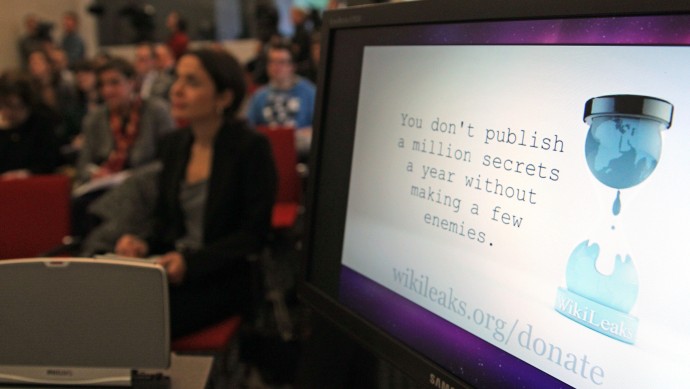
(MintPress) – Documents released recently by WikiLeaks show that the 2011 blockade on Visa and Mastercard transactions are in breach of U.S. Treasury laws. The action has been crippling for the online free speech project, potentially wiping out 95 percent of the site’s revenue of approximately $50 million. Instead of going the traditional legal route, it appears that the sanctions simply come at the behest of Sen. Joseph Lieberman (I-Conn.) and Congressman Peter King (R-N.Y.), who have been described as “right-wing extremists” by Julian Assange.
The sudden action demonstrates the willingness to circumvent the U.S. Treasury Department, an institution tasked with regulating financial transactions. Although WikiLeaks is in breach of U.S. law for sharing classified documents, the firestorm of criticism against a non-violent “not-for profit” media organization demonstrates the power of free speech activism in shedding light on war crimes and egregious human rights violations.
The financial blockade
Since its launch in 2006, WikiLeaks has published hundreds of thousands of classified diplomatic cables and high level correspondence that shed light on U.S. war crimes in Iraq, Afghanistan and other conflict zones.
Although sharing these documents is illegal and punishable under U.S. law, many advocates have defended the site, claiming the project has helped to inform the public and expose a much greater set of state sanctioned crimes.
Assange, the main promoter of the WikiLeaks site, describes the financial blockade as being promoted by “right-wing extremists,” in the U.S. The outspoken Lieberman and King have interceded under the guise of protecting U.S. security interests, but their conduct is not in keeping with the established route for labeling and sanctioning entities that threaten U.S. national security.
Lieberman has called previously for WikiLeaks to be labeled a terrorist organization and has pushed for strengthening the Espionage Act of 1917. Bradley Manning, one of the key whistleblowers responsible for the WikiLeaks tape, Collateral Murder, is being tried under this act.
Released in 2010, the video shows the wilful killing of innocent Iraqi civilians and foreign journalists on a U.S. helicopter gunship. Although nothing has been done to prosecute those responsible for the murders, the video has caused outrage in Iraq and the international human rights advocacy community.
Despite this, Lieberman, King and others have continued their attacks on the website under the guise of promoting national security and thwarting terrorism. After the first major cache of 250,000 cables was released in 2010, Lieberman commented, saying,
“WikiLeaks’ deliberate disclosure of these diplomatic cables is nothing less than an attack on the national security of the United States, as well as that of dozens of other countries.”
Although such sanctions are in keeping with how the Treasury Department would respond to foreign terrorist organizations, the two lawmakers appear to have worked outside the established process of law, coercing Visa and Mastercard to stop processing transactions involving the WikiLeaks site.
Congress does have the authority to regulate commerce between states and countries, as outlined by the U.S. Constitution, Article I Section 8, clause 3, stating,
“The United States Congress shall have power to regulate Commerce with foreign Nations, and among the several States, and with the Indian Tribes.”
Assange condemned the recent blockade in a public statement, saying, “It is concerning that hard-right elements in the United States have been able to pressure Visa and Mastercard into introducing a blockade that the U.S. treasury has rightly rejected.”
Economic blockades are normally controlled by the U.S. Treasury Department’s Office of Foreign Assets Control (OFAC) and have been employed previously as a punitive measure against countries and terrorist organizations unfavorable to U.S. political and economic interests. The mission and powers of the OFAC listed on their website, states,
“The Office of Foreign Assets Control (OFAC) of the US Department of the Treasury administers and enforces economic and trade sanctions based on US foreign policy and national security goals against targeted foreign countries and regimes, terrorists, international narcotics traffickers, those engaged in activities related to the proliferation of weapons of mass destruction, and other threats to the national security, foreign policy or economy of the United States.”
The blockade of Cuba, imposed shortly after the revolution of 1959, is an example of a sanction used by the Treasury Department to supposedly accomplish a political end. However, the joint action by Lieberman and King appears to have circumvented the traditional route for designating and sanctioning foreign terrorist organizations.
What is more shocking to Assange and WikiLeaks supporters is the fact that EU finance ministers do not find the move objectionable. Having reviewed EU antitrust laws, some finance ministers have shown support for the financial blockade.
The EU executive body has yet to officially rule on the issue. However, an anonymous commission spokesperson commented on the issue, saying, “On the basis of the information available, the Commission considers that the complaint does not merit further investigation because it is unlikely that any infringement of EU competition rules could be established.”
Many EU states are responsible for similar war crimes and government corruption. It is no surprise then that the U.S. and the EU, already close allies, appear to move in lockstep with one another on this issue.
Julian Assange carries on
Meanwhile, in London, WikiLeaks founder Julian Assange continues his months long battle against extradition to Sweden for alleged sex crimes. The free speech activist has been hiding in the Ecuadorian Embassy in London since June, having received permission to reside at the embassy for the foreseeable future.
Although he secured political asylum, he has been unable to leave the embassy for fear of arrest by U.K. authorities.
Assange is wanted in the United States for crimes including spying and sharing state secrets.
“My stay here in the Ecuador embassy, while difficult in many ways, at least I am able to continue my work to some degree,” said Assange in a recent statement.
Assange has millions of supporters who frequent the WikiLeaks site and until recently were able to contribute freely to the project. Few in higher policymaking circles have expressed support for the project. However, a small, but vocal opposition in Congress has expressed outrage that the act of exposing crimes, corruption and misconduct are punishable.
The recently retired Congressman Ron Paul (R-Texas) defended Manning on the floor of Congress in 2010, saying, “In a free society we’re supposed to know the truth.” He added, “In a society where truth becomes treason, then we’re in big trouble. And now, people who are revealing the truth are getting into trouble for it.”
While they may be breaking national laws in Europe and the U.S., the moral justification stands decidedly in favor of Assange, Manning and the WikiLeaks project. Naturally, any power or authority shown to have committed such egregious crimes will deflect blame by prosecuting free speech advocates.


